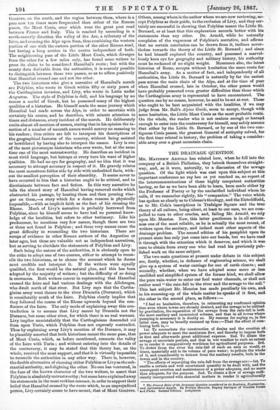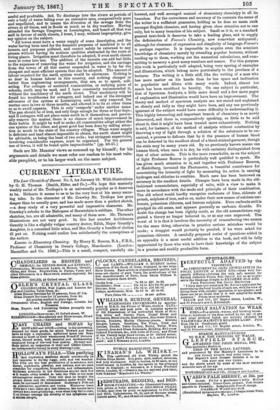THE DRAINAGE QUESTION.
Mn. MATTHEW ARNOLD has related how, when he fell into the company of a British Philistine, they betook themselves straight- way, and, as it were, naturally, to a discussion of the sewage- question. Of the light which was cast upon this subject at this. important conference no ray has as yet reached us, no report of the intercommunications of these highly competent authorities- having, so far as we have been able to learn, been made either by the Professor of Poetry or by the unclarified individual whom he- calls, if we remember rightly, his " companion." The voice which. has spoken so clearly as to Colenso's theology, and the Eisteddfodd, as to Mr. Cole's inscriptions in Trafalgar Square and the true- theory of all culture, being silent, at least to our ears, we are com- pelled to turn to other oracles, and, failing Mr. Arnold, we rely upon Mr. Menzies. Now, this latter gentleman is in all serious- ness one of the most reliable, as he is actually the most recent, of writers upon the sanitary, and indeed most other aspects of the drainage problem. The second edition of his pamphlet upon its present state has only just come into our hands, but we have read it through with the attention which it deserves, and which it was
to obtain from every one who had read his previously pub- lished work on the same subject.
The two main questions at present under debate in this subject are, firstly, whether, in defiance of engineering science, we shall give up a system of wate,r carriage for one of earth closets ; and secondly, whether, when we have adopted some more or less. modified and simplified system of the former kind, we shall allow the pure rain-water to enter our foul water channels, or shall not rather send " the rain-fall to the river and the sewage to the soil." This last subject Mr. Menzies has made peculiarly his own, and in his summing-up of the whole matter he speaks of it first, and the other in the second place, as follows :—
" I feel no hesitation, therefore, in reiterating my confirmed opiniom that even where towns are already drained, and the sewage to be utilized by gravitation, the separation of the sewage from the rain-fall is both the most sanitary and economical scheme, and that in all towns where pumping is necessary it is doubly so. My reasons for saying so, in the latter case, may be broadly summed up thus :—That the effect of com- bining both is,- 1st. To necessitate the construction of drains and the erection of power adequate to meet the maximum flow, and thereby to impose both at first and afterwards great additional expense. 2nd. To dilute the- sewage at uncertain periods, and that in wet weather to such an extent as to render it comparatively worthless for agricultural purposes. 3rd. To divert from the river the rain-fall of such an area as would, at times, materially add to its volume of pure water • to pollute the whole of it, and considerably to detract from the sanitary results, both in the towns and in the country.
"The effects of separating the rain-fall from the sewage are:-1st. To enable a certain and well ascertained quantity to be dealt with, and the consequent erection and maintenance of a power adequate, and no more than adequate, for the purpose. 2nd. To obtain a flow of sewage suffi- ciently incorporated with manurial matters to render it agriculturally
* The Present State of the Drainage Question considered in its Sanitary, Engineering. and Agricultural Aspects. By William 31euzies. Deputy Surveyor of Windsor Forest nod Parks. Second Editiou. Longman,.
useful and profitable. 3rd. To discharge into the rivers at periods of rain a body of water falling over an extensive area, comparatively pure and unpolluted, and to insure the diversion of the sewage from the rivers at all times, and in floods as much as in dry weather. Having attended the Sewage Congress at Leamington, and heard all that was said in favour of earth closets, I trust, I may, without impropriety, give my opinion on the subject.
"All towns must have a water supply of some description, and the water having been used for the domestic purposes of mankind is to all intents. and purposes polluted, and cannot safely bo returned to any stream without having its noxious qualities abstracted by the roots of living plants. Irrigation must therefore be adopted, if even earth closets were to come into use. The addition of the excreta can add but little to the expenses of removing the water for irrigation, and the carriage from the towns of all this matter suspended in water is by far the cheapest and most efficient system that can be adopted. The amount of labour required for the earth system would be enormous. Nothing is so dear as human labour in this country, and nothing cheaper or better than engineering arrangements, that are, so to speak, self- acting. For cottages or scattered communities, or outlying parts of schools, earth may be used, and I have constantly recommended it, without the machinery of the earth closet. That machinery will be found too troublesome for cottagers, and indeed one of the strongest .advocates of the system at Leamington said he only removed the matter once in two or three months, and allowed it to lie at other times so as to avoid expense. This is only `cesspools' under another name. The pan should be of iron, and only large enough for three or four days ; and if cottagers will not place some earth in it themselves, and person- ally remove the matter, there is no chance of much improvement in their habits. It might be well to make all communities adopt either the one system or the other, and great good has been done by calling atten- tion so much to the state of the country villages. When water supply is deficient and land almost impossible to obtain, the earth closet might be advisable, as being the least of two evils ; but stringent supervision, involving considerable expense, must be organized. For the general 'use of towns, it will be found quite impracticable." (pp. 50-51.)
Such are Mr. Menzies' views as summed up by himself ; for his arguments and details we must refer our readers to his most valu- able pamphlet, or to his larger work on the same subject.































 Previous page
Previous page